#they are both in danger of corruption but it's affected them in different ways and i dont know how they'll reconcile those differences
Explore tagged Tumblr posts
Text
I'm really excited for the imodna reunion, but I'm also absolutely fucking terrified
#critical role#laudna#imogen temult#imodna#they went through such different experiences#imogen had a bad time but she didnt kill someone who betrayed them#laudna is terrified she opened the door for delilah to walk right through again and shes terrified of what she's done#she is not the same laudna she once was#she will probably still try to stay upbeat nd positive and so supportive but how long can she hide her deepest fear from a telepath?#they are both in danger of corruption but it's affected them in different ways and i dont know how they'll reconcile those differences#also i really hope we get some angst with prism#i need to see jealous imogen again#especially if there's gonna be imodna angst anyway
135 notes
·
View notes
Text
Drow Lore 🕷️ Drow Terms Of Address (part 2)

More terms of address for drow characters and (Lolth-sworn) drow - drow interactions. This time a few tips on how to address your drow lover in various types of relationships 🖤
🕷️ Choosing A Lover - in a Lolth-sworn drow society, a female always makes the first move. In theory, she is free to sate her physical desire with whatever partner arouses her attention. In practice, though, it is not always that simple. Sometimes things get complicated: when the person she wants has already been claimed by another female, or is subjected to someone more powerful, or is a member of a rival noble house, or (in case of females) has much higher station than her.
Drow males cannot choose their lovers, at least not female ones. In a Lolth-sworn drow society, they have no right to consent - or to refuse to consent, for that matter. They are simply taken by females and they are expected to comply and satisfy them, since rejecting (or disappointing) a female is customarily punished. It is not uncommon for females to torture or even kill their male lovers on a whim.
Typical (female) drow pickup line is probably something similar to kla'ath ussa, jaluk ('serve me, male').
🔹 Drow can refer to their lovers as: xi'hum ('pet', 'plaything'), seriso ('lover'), m'ranndii ('mate'), also mrimm d'ssinss ('female lover') / mrann d'ssinss ('male lover').
Mrimm d'ssinss means literally 'inspiration of seduction / allure / charm'. Both mrimm d'ssinss and mrann d'ssinss are terms that may indicate some dose of admiration - they also sound quite intimately, like half-purrs, half-whispers.
🕷️ Lover Of A Noble Female - matron mother's chosen mate is called ilharn ('patron'), but she is free to take as many lovers as she wants to. A male lover who is not the patron of the House, but enjoys the matron's favors, is called parzdiamo ('male playmate'). A lover of a noble female with more or less established status can be called zil ('consort').
Being attached to a powerful female is often seen by drow males as a way to raise their social status - patrons (or favoured consorts) usually have rivals seeking to undermine their position.
Males born or adopted into noble houses, especially the most talented or promising ones, are treated in many ways like their matron mother's property. Matron mother has the right to decide which females can or cannot have them, and she may even "borrow" the most valuable males to females of other houses - in exchange for favors, information etc. Such males are sometimes "borrowed" for breeding purposes.
🕷️ Lover With Feelings - developing genuine feelings for your drow lover may be a very bad idea. Such a thing is not only dangerous (according to drow, all trust is foolish), but it is also seen as unbefitting a drow and forbidden - and can be punished with torture or even with death.
It applies especially to female-male relationships (the fact that Lolth really, really hates her ex-husband may have something to do with this aspect of Lolth-sworn drow culture).
Drow do fall in love, though - very rarely and mostly with other drow, since they tend to perceive non-drow as inferior. According to Drow of the Underdark, 3.5e: "the sudden urge to consider someone else's well-being is a strange and frightening experience [for a drow]. Many drow react violently to love, seeking to destroy the object of their affections before they are further "corrupted" by the odd sensations. Those who don’t become violent usually make every effort to either impress or dominate the object of their affections, depending on their relative social standing. (...) for even the most loving drow sees little difference between intimacy and possession."
🔹 Drow can refer to a loved one as 'che ('loved one' - or at least as close as a drow term can get to the meaning of this word) or 'chev ('beloved'), or even quor'vlosara ('soulmate').
🔹 Drow can also use terms of endearment like ussta ssinssrigg ('my love / longing / passion' - ssinssrigg traditionally means all these things, also 'greed' and 'lust'), or ussta alurlssrin ('my love' - alurlssrin means unselfish, deep love; it is a term introduced to drow language by Eilistraeans, so probably not widely known in the Underdark).
🔹 (From BG2) ussta mzilst ssin'urn ultrin ('my most handsome / beautiful conqueror') - words of a female drow who has fallen in love with a man from the surface.
In a Lolth-sworn drow society, lavishing your drow lover with sweet words and tender gestures is something that should be done only in private - being discovered can mean torture and / or death for one or both of you.
For more of my drow lore ramblings, feel free to check my pinned post 🕷️
337 notes
·
View notes
Text

'The Stuff', ''Starburst Magazine'', #83, 1985 Source When I was 10 at the time this B-movie emerged from the ground, I had no idea that it was intended as a criticism of Reagan era American consumerism and, more specifically, the failure of federal regulatory organizations like the US Food and Drug Administration due to regulatory capture by the very industries the FDA was charged to oversee (also due to the hostility towards such agencies held by the Reagan administration*) it's a cheap amalgamation of films like Invasion of the Body Snatchers and The Blob and various 50s scifi films. Sure, the acting is both undercooked and, paradoxically, overly exaggerated and the script is less than robust but it's still worth a watch as a satire. The ads for 'The Stuff' within the film are presented straight and are hardly different from advertisements for actual products. In a way, 'The Stuff' is a prime example of iconoclastic, low-budget filmmaking with a message. It would be a great pairing with John Carpenter's 'They Live' given their shared anti-capitalist sentiment (although, to be fair, Carpenter has been open about being perfectly happy to make money). I was recently reading about the director of 'The Stuff', Larry Cohen and came across the following in 'Larry Cohen : the radical allegories of an independent filmmaker', from 1997: "Robin Wood hails Cohen’s work for suggesting potentials for an alternative society devoid of all the oppressive social and gender boundaries affecting human beings today. Larry Cohen’s film and television works are critical of the oppressive nature of human relationships....The Stuff represents an ironic elaboration of the old saying “You are what you eat.” However, the film’s absurd premises really reveal the dangers of American consumerism. Business interests and the Food and Drug Administration collaborate in merchandising a dangerous substance on the market to make a profit. The killer yogurt from outer space destroys people from within. Its victims become mere shells housing a killer substance. Cohen’s message can be read literally as well as metaphorically. The Stuff is an attack upon a corrupt society that often deliberately disseminates food or drugs without even testing them properly." (pgs 29-30)
In summary, the execution of the premise is lacking but still fun. I must rather enjoy 'The Stuff' given how I periodically post about it. *fuck Ronald Reagan. Forever.
59 notes
·
View notes
Text
Almost Universally Accepted

If you ever wonder why people like me think the Teen Wolf fandom has become fundamentally corrupted by racism, you simply need to recall that there is, as one person on this site remarked recently, an 'almost universally accepted' headcanon among the fandom. Based on a single glance near the end of the first episode of the third season, Tattoo, a large number of people in this fandom believe that Stiles Stilinski helped Derek Hale and his pack look for their kidnapped betas over the summer between Scott's and Stiles's sophomore and junior years. In terms of the television production, this would be the hiatus between Season 2 and Season 3.
At first, it seems a perfectly harmless headcanon, but I believe it's a blatant example of how fandom racism degrades media literacy. Allow me to walk you through my reasoning. To start, most headcanons exist in a neutral state with regards to canon. When you speculate on a character's favorite ice cream flavor or whether they spend Christmases with their grandparents, it is most likely not going to affect how you view the canon. This particular one, however, modifies a crucial canon event, one which establishes both the relationships and a major part of the plot for an entire season. Coincidentally, those relationships and that plot are primary motive forces for the lead protagonist's character arc. Thus, accepting this headcanon requires the viewer to radically reinterpret the starting point of an entire season differently than the production's actual intention. It's such a radical change that any critical thinking requires a person to ask what the goal of this headcanon could possibly be, since it simply cannot fit within the canon itself.
Point One: The headcanon is entirely unsupported. Consider the image at the top of this post. That look on Stiles's face is, as far as I can tell, the sole trigger behind the creation of this suspect headcanon. Stiles makes eye contact with Derek and, apparently, looks guilty to the fandom. From this, Stiles is supposed to be sharing a private moment of remorse with Derek, to which Scott is not privy, about their inability to find Boyd and Erica over the summer.
Even given the possibility that the look on Stiles's face could also be interpreted as genuine concern for the fates of Boyd and Erica, regret that something new is coming for Beacon Hills, or even frustration that Scott is getting involved once more in something dangerous, the headcanon's interpretation does not in any way mesh with the actual lines spoken in the scene.
Derek: A pack of 'em. An Alpha pack. Stiles: All of them? How does that even work? Derek: I hear there's some kind of a leader. He's called Deucalion. We know they have Boyd and Erica. Peter, Isaac, and I have been looking for him for the last four months. Scott: Let's say you find them. How do you deal with an Alpha pack? Derek: With all the help I can get.
If Stiles has been working with Derek all summer to find and rescue Boyd and Erica, this dialogue makes no sense. Wouldn't Stiles already know about the alpha pack and how it works? Why would Derek not list Stiles among the people searching? It would require Stiles and Derek (and later Peter and Isaac) to deliberately decide to exclude Scott. Those who adhere to the headcanon never actually explain why that Stiles and Derek would want to conceal Stiles's participation in the search from Scott, but that's not their point.
Yet, while a conspiracy might explain why they don't reveal the secret here, it doesn't even begin to address while it is never mentioned elsewhere during the season (or any season). It also renders the dialogue between Derek and Stiles and between Peter and Stiles in Chaos Rising (3x02) incongruous. It makes the relationships between Stiles and Isaac and Stiles and Boyd incoherent. It makes the way Stiles treats Derek throughout the rest of the season nonsensical. But that's not all.
Point Two: It shreds characterizations for everyone but Scott. Take Stiles. In the last appearance of Stiles in Season 2, he tells Scott that "you still have me," in an incontrovertible statement of support. Why would a Stiles who made that promise hide this information from Scott; not just in this scene but in every scene about the Alpha Pack to come. If he was trying to keep Scott out of the supernatural things, then he didn't do a very good job; after all, he's the one who tells Scott about the Darach once Stiles discovers it. If he's secretly angry at Scott for something (whether it be not finding him when Gerard kidnapped him or some other fandom-conjured reason such as Scott 'ignoring' him all summer), then why wouldn't he use it when he argues with Scott in Unleashed (3x04), Frayed (3x05), Motel California (3x06) or Currents (3x07)? For this headcanon to be even remotely valid, it has to suppose that Derek and Stiles established a positive working relationship, but Derek is the one person to whom Stiles doesn't bring his ideas about the Darach. Why the sudden and unexplained change in regard?
Take Derek. If Derek trusted Stiles enough to have him help his pack look for Boyd and Erica over the summer, why would Derek so casually and cruelly dismiss Stiles's assistance after the recovery of Isaac ("Not You!"). If Derek is simply trying to keep Scott out of this -- which is actually seen on the screen -- isn't it callous of him to not have tried to keep Stiles out of it? And if Derek is angry enough with Scott not to seek his help over the summer (though this emotions doesn't stop him from accepting and asking for Scott's help visually on the screen), why doesn't Derek ever bring up that he trust Stiles enough to help but not Scott?
Keeping this a secret throughout the entire season doesn't match anyone else's character, either. Why didn't Peter use it to needle Stiles in Chaos Rising or needle Scott in Unleashed? Why does Peter, who is consistently portrayed as manipulative and using other people's misdeeds to excuse his actions ("I'm not the only dysfunctional family member.") not use it to undermine Derek's or Isaac's trust in Scott? For that matter, why doesn't Isaac use it in any of the conflicts he has with Stiles? It simply doesn't fit in with anyone else's behavior or characterizations.
Part Three: It does, however, serve to undermine Scott's role as lead protagonist. This is, at the base, the point. It's not really a starting point for Sterek that they claim it to be; a massive conspiracy doesn't really establish the impetus for their relationship considering how they both canonically treat Scott later. It does, however, serve as a coded way to establish the white male characters in the show as a social group in and of themselves, one from which Scott must be excluded, perhaps because of his inadequacies (he has to go summer school, see, which in Beacon Hill seems to be envisioned as a boot camp-slash-gulag) or his sins (not sacrificing Allison) but there has to be a reason. When you take in the way it doesn't fit into anything happen and doesn't really help what they want to happen, the only logical reason for the creation of this headcanon is that it demonstrates their belief that Scott does not deserve his position as lead protagonist, and that Stiles's professed loyalty is slowly being transferred to a man he had on a list of people responsible for human sacrifices twice.
But it is inevitable that such headcanons go against the themes of the show, the plot of the show, and the established characterizations of the cast, because consistency is not really important to parts of the fandom. What is important is that it suggests the true focus of the story should be where the believe it belongs: any white male character. This ill-fitting whim has become almost universally accepted, to remove a character of color form his position as lead protagonist with a subtext so deep it appears for exactly 2 seconds.
It is indeed racism.
#scott mccall#derek hale#stiles stilinski#teen wolf fandom racism#fandom racism#tattoo#tw 3x01#fandom problems#teen wolf fandom problems
52 notes
·
View notes
Text
The Foundation vs Manus Vindictae
This idea was inspired by @ihaveforgortoomany ‘s post here!
It’s so fun that the story makes sure we know and see that the difference between The Foundation and Manus is the head start the Foundation has on being an established organization, and whether they pretend to be good. This is also like you said, a big part of why the Foundation wants to restore time. They had a massive advantage in being a long time establish organization. In Regulus’ time, it was implied from her reaction the Foundation had full authority to approach Arcanists and register them, or at least strongly convince them to join. Manus tries to have a persona of salvation over pure goodness but this is maintained moreso because they can’t actively gaslight people.
If you look into The Three Doors and see how people were affected by the incomplete version of the Artificial Somnambulism. They were going insane because it was never a good machine with good intent. It was made to use frequencies to manipulate the mind of an arcanist. While Laplace employees use the machine in order soothe injured arcanists or panicking ones, that doesn’t mean they’re not brainwashing members. They bend reality for these people to comfort them but that comfort is built on dependence and complete trust of the Foundation. Which is why on of my theories is that the AS is a reason Arcanists have mental breaks so frequently in the Foundation, the Manus has breakdowns within their ranks however that’s from exposure to the Manus Masks carrying The Storm chemical within them. Name Day in Getian’s character story event even has a mention that the AS is very dangerous for the way it gets into someone’s head, and Getian breaks into it because he had experienced something similar. He’s then able to have them see what he wishes. Taking what Jessica saw in [The Old One Flew Over the House], the AS is also used as a training tool for arcanists and a way to get true test answers out of them. Why would she need to take her exam in the AS when she could simply answer Foundation staff 1-1?? There’s no point of it besides getting into Arcanist’s subconscious. The reason this doesn’t work on Vertin anymore is because she holds zero trust for The Foundation anymore.
I think Arcanists in general tend to take a lot more mental stress from contradictions in their heads, for instance people create false memories if they have a gap in their memory because the brain doesn’t like having gaps there. We’d rather lie to ourselves or create a false reality than deal with pure unknown, but with The Storm no one knows what anything will be next.
After the events of Book 3, Vertin no longer places her trust in the Foundation because she knows what Constantine did. Madam Z wasn’t able to find out in time to save them, so Vertin watched her classmates disappear in front of her because Constantine wanted to unlock the potential in her. She then went on her own journey to record the eras directly, without being able to save anyone. Vertin won’t ever leave The Foundation because their goals align, but she might one day near the end of the story work with Madam Z to overturn the current system. Sonetto on the other hand has an imminent fate of her loyalty breaking towards the Foundation. She already suspects them of being morally corrupt at least to her standards, and she’s torn between choosing them and Vertin. From how we see her trust Vertin in [A Nightmare at Greenlake] + how she doesn’t make any comment on following the rules when Horropedia is blatantly breaking them, I think her loyalty switches to Vertin at some point.
Also a big theme is that Manus and Foundation both very much consider people expendable. The Manus treats weaker arcanists and humans blatantly as canon fodder, but Constantine sacrificed a group of children because they were defectors (Horropedia makes a note about how their actions had the entire school talking to the point they ran out of space to discipline them) and it might push Vertin to want to go out into The Storm to find a cure in the Name of Peace.
#yapping#reverse 1999#reverse: 1999#r99#re1999#manus vindictae#the foundation reverse 1999#the foundation#st pavlovs foundation#honeystar
62 notes
·
View notes
Text
Clover's personality (in-depth)
This thing turned out way longer than intended. As promised, I wrote my opinions in regards to Clover's mbti; I also wanted to include the enneagram but figured it would be too much, so I'll do that separaretly. For those who wanna get straight to the point, just scroll to the end of the post for a pic of the functions I think Clover has. But if you want more details, read the whole thing. Probably not many people will wanna do that, but I had fun, lol. Please excuse me for nerding out
Analysis
Even before they got into the Underground, Clover thought to themselves "Ok, this is a dangerous mountain and I ain't coming back, I'm probably gonna die and therefore not live to see the rest of my life play out BUT I'm gonna follow my values anyway. They're worth the risk." To me, right off the bat, that's Fi over Ti (aka inner values and morals over inner facts and logic).
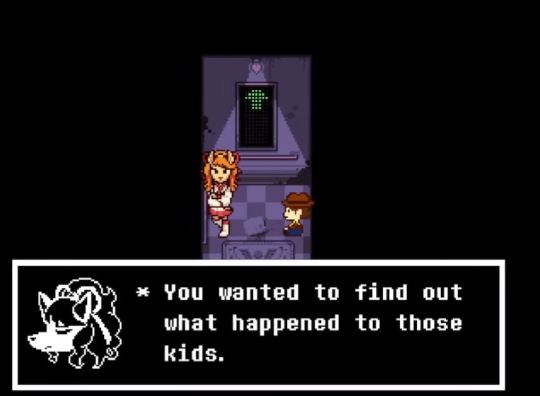
I've done some research on this stuff and found out how "Fi knows the value of something not by analyzing it but by feeling it deep inside themselves that it is how it should be" Ti has to be as objective as possible, Fi doesn't. So I sat down and thought about how exactly Clover approached situations.
I feel like their main reasoning for being in the Underground were their inner values and beliefs of finding out what happened to the children. That's why I'd say they're an introvert rather than an extrovert (it's not because they're quiet and reserved, although they are, but because Clover's inner world affects their outer world). Now, both Ti and Fi look inward, and those inner thoughts and feelings affect how they interact with the external world. The real question is: is Clover objective enough to be considered a dominant Ti user?
We can see in the Vengeance route that Clover is stubborn with their beliefs and refuses to look at things from a more... logical POV: "Asgore killed five humans. Is it fair to wipe out every other monster in my way who gives me even the slightest reason to do it?" Martlet was the only exception because she was the only one who had tried to be nice and understanding. Clover's dark side is that they're tunnel-visioned and see morality as black and white (don't look deeper as to WHY the monsters do what they do), and blindly follow their own beliefs over what objectively makes sense. Just like Ceroba, who I'm positive is a feeler (she only considers how she felt about Chujin and not how skilled of an engineer he actually was, even when there's clear proof he wasn't the best at his job).
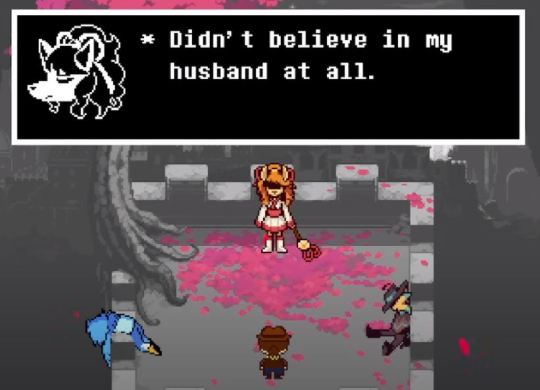
Objectively, it's not fair to kill so many monsters after only five humans were killed. If Clover wanted fair vengeance, they would have stopped after five monsters were killed. But no. According to Clover's own logic, everyone morally imperfect, everyone who's hurt them, who tried to hurt them, or messed up somehow, must die. So, Clover isn't thinking about what makes sense; they're thinking about what makes sense to THEM, and stubbornly hold onto that till the end (again, like Ceroba), even after Martlet's warnings. She says how the Royal Guard will be after them.
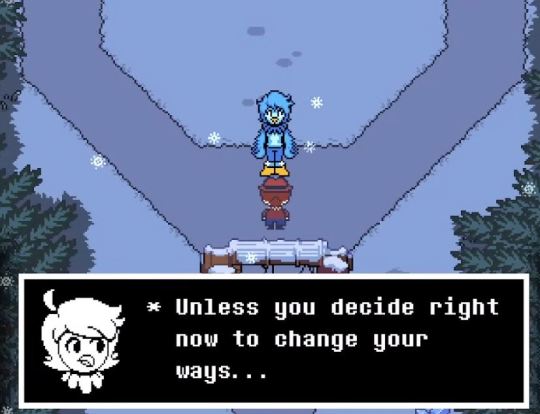
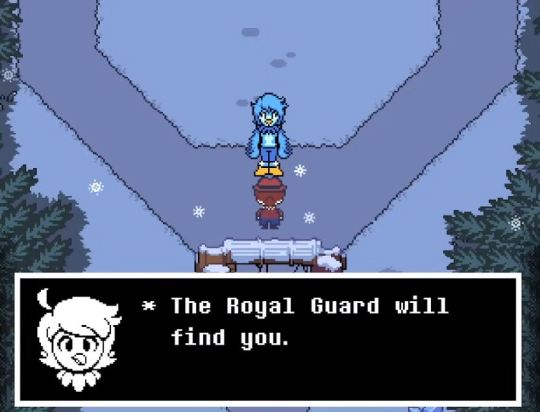
The logical (T) thing to do would be to STOP before things become even messier, but once again, no. Clover doesn't care about the consequences, only fulfilling their mission that is driven by their own set of values. No matter which route you choose, you will be presented with Clover's own version of what "justice" means. It's not the objective truth, it's not what's the logical thing to do; they follow their own framework based on their (our) choices.
"If unhealthy INFPs are dealing with threatened values or viewpoints that oppose their own, they can go the other way and imagine that others are all corrupt, thinking badly of them, and deluded. They may see themselves as the only people who see “the truth”, or the only people who really care to make a difference in the world. They can become especially harsh and critical of others and take on a martyr role, gradually secluding themselves from other people". - this feels like geno Clover; they thought they were the hero but they were playing the villain all along
Now that I think about it, the logical thing to do, the one that makes the most sense, would be never to have entered Mt. Ebott in the first place. And if vengeance was what Clover wanted to do, it is fair and makes objective sense to kill only five monsters (since that's how many humans died). But as explained, Clover didn't follow that logical conclusion, but rather their own twisted sense of justice. The same goes for neutral. It's Clover who chooses who gets to live and who gets to die based on their own beliefs and feelings, which are not backed up by facts. Everything they do they do because they themselves feel like it should be done. They are the one who decide who gets to live and who doesn't based on their own opinion/how severe they think the misdeed of the final boss is. This counts for the regular monsters who attack them, too; again, THEIR own subjective decision.
For example, they might see Dalv's actions as acceptable/forgiveable and spare him, but not Starlo's and kill him. Objectively, both characters are messy in their own way, but Clover gets to be the "judge" and decide their fate, not objectively looking at the situation, but subjectively. In short, according to them, Dalv may deserve to live, but not Starlo.
And even if they're a dominant Ti user, which I don't think they are, Clover is more past and future-oriented than present-oriented (N over S). As mentioned, they thought about how much they'd risk by going down Mt. Ebott (potentially dying, and definitely never seeing the surface ever again, or their family) but they followed their heart's desires; to them, morals and ethics (their own morals and ethics) were more important than what the more logical thing to do was (stay on the surface where it's safe).



In other words, they could already "predict" what would happen in the future, while in the present moment (the beginning of the journey).
And right before sacrificing their soul in pacifist, they think about how their death would affect ALL the monsters in the future, whether they had directly met and befriended them or not, even though they wouldn't be there to see it.
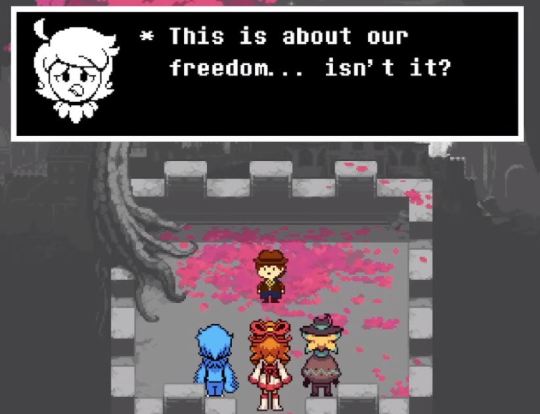
Clover seems to be able to easily move between the past, present and future, unlike sensors, who are mainly in the present moment (this is what I've heard somewhere at some point and remembered it, dunno how true it is). They can easily recall the past, and what they remember are things that moved them on the inside.
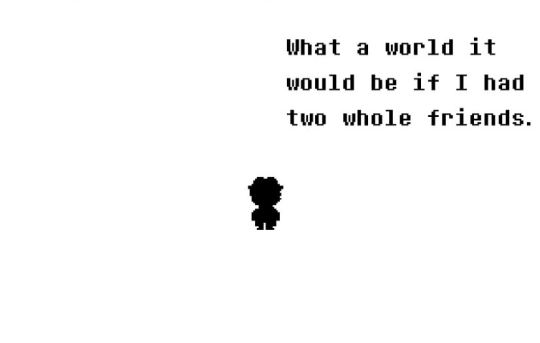
I've heard some of my friends say that Clover's character arc was to become a kinder person (develop their Fe), which, honestly, I don't think is the case. They simply acted on their inner views of what justice truly means, without further analyzing whatever they believed justice to be.
In pacifist, they're naturally selfless and kind and forgiving: a bit of a prankster, but they're one of "the best souls" according to Martlet. Just look at the ACT options that they used to befriend monsters. Quietly listens to Decibat, offers Dalv a handshake (and friendship), easily forgives Martlet, Starlo, and even Ceroba (+ gives her a hug), endures so many hardships yet keeps their heart pure and selfless.
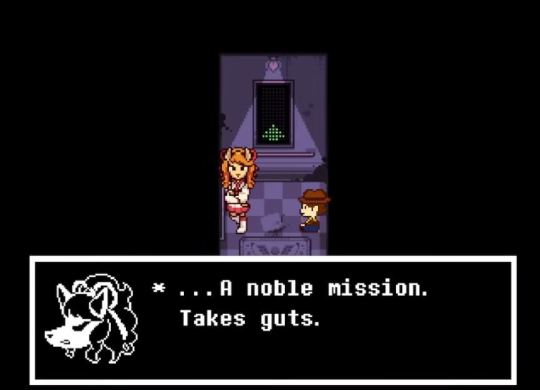
They were always driven by something bigger than themselves (like Chujin, who I also think is a N user).
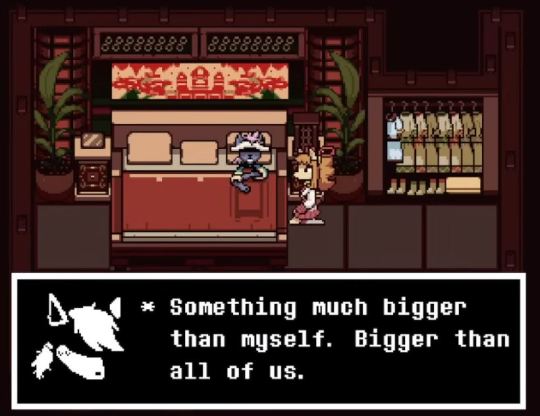
ISTPs are more adventurous and independent and flexible and focused on current problems in the present moment; Clover has been future-oriented from the start; they depended on Toriel to take care of them, and didn't try to immediately "adapt" to the monster world. Their 1st reaction was to stay safe and cozy. ESTJs (yeah, at some point I thought Clover could be one) are more "ruthless" in their pursuits, they "force" others to adopt their inner values. Clover doesn't do this in any route; they simply act upon their own beliefs, but aren't demanding that other monsters to have those same beliefs.
That's why I think they're an INFP.
Functions
Fi (dominant) – "If something goes against their moral code, they will not go through with it." It went against Clover’s moral code to spare monsters in genocide and abort the mission, so they didn’t, regardless of Martlet’s warnings.
"Fi dominants are inclined to speak up against beliefs or actions that go against their personal values or express disapproval of certain behaviors." I can't find the screenshot, but in the Mines, if you interact with the character who's in the same room as one of the puzzles, Clover will find out how that character pulled a prank on that guy who later got a promotion in the pacifist end credits (I need to reply the game to find the screenshot). But basically Clover was upset that their own morals weren't met and gave them a "disapproving look" or smth
"Ti dominants most often feel compelled to speak out when people are acting inconsistent (ie: contradicting themselves) or when people are being illogical from the Ti user’s perspective." I think Clover reacted to the above situation as a Fi user
"Unlike Fe users, Fi users are very blunt and direct. Fi and Te creates a person who is brutally honest about their opinions and feelings. If they don’t like a person, they will let that person know." Not a person in this case, but an example of this are the options we get for Martlet's questionnaire. Clover will have no problem honestly giving her the lowest scores for both questions; we also also get the chance to honestly tell Ceroba that we're not into Starlo's training. There are these cases where they're direct as well:
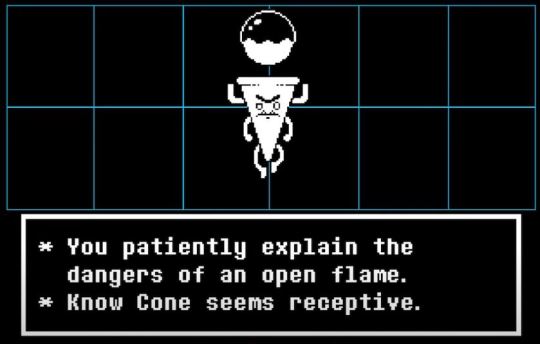
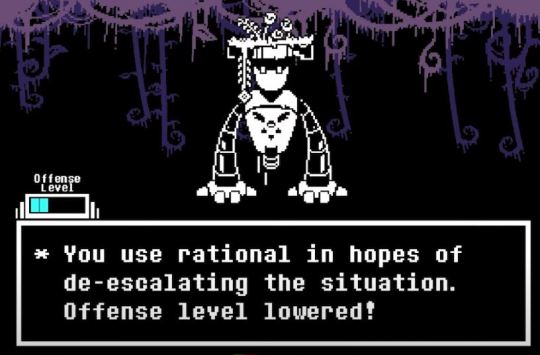
...and blunt:
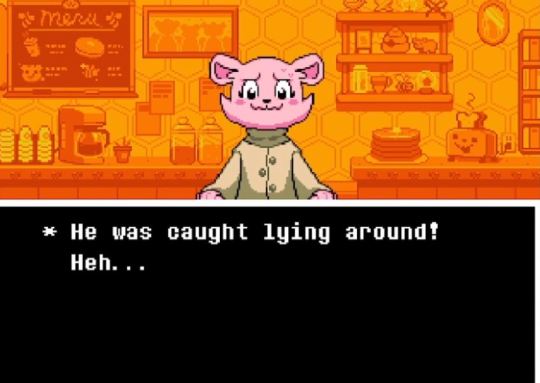
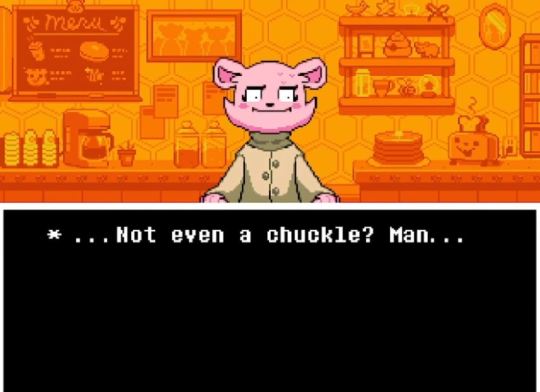
they would have given at least a smile or a thumbs up, but no, their honest opinion is their honest opinion
"They appear cold and withdrawn, but tend to warm up as they get to know a person."
Ne (auxiliary) – "Ne views a situation from multiple angles and motivations" I feel like this is best seen in pacifist; this is exactly why Clover decided to give up their soul in the end; they saw all the motivations of the monsters, from many different angles. On the flip side, in the vengeance route, it’s the complete opposite situation: Clover only looks at things from their own pov, completely disregarding others. That’s the thing about the INFP dark side: INFPs become "disillusioned or stuck in their ways." This 100% describes Clover at their worst: stuck in their ways is already explained, while we can say they were disillusioned when even Martlet turned against them/gave up on them (in Genocide). That was enough of a reason for Clover not to feel bad about finishing her off. They never liked her, but they definitely liked her more than anyone else, so I’d say it counts.
"Creative, open-minded, and able to think outside the box" We can say Clover’s creative when they build Axis’ robot companion, solved the two puzzles in the Mines, they’re also most likely into role-playing just like Starlo, based on their clothes (and they seemed into the whole larping thing with him), and how they seem to be into drawing; open-minded, definitely (Clover with everyone; the pacifist route in a nutshell); able to think outside the box (this goes hand in hand with them being creative: I forgot to mention the many creative ways they found to befriend monsters)
"Ne lives in the present like Se does but makes connections to past and future." Imo, this is exactly what Clover does (their sacrifice in the future, and all the things other monsters had said to them in the past; however, they DO interact with the present world at the same time. This is what I meant when I mentioned how they "jump from and connect all 3")
Si (tertiary) – "happy in their comfort zone" Is this Clover? Yeah. Initially, this was their "default" reaction/behavior: with Toriel. They subconsciously became more independent thanks to good old Flowey. As I said, their values led them to take the risk and come into the Underground in the first place, not adventure/excitement (the way I see it). Were they also seeking the truth? Yeah again, they wanted to know the truth behind the whole situation, but I think it had more to do with how they had found the fact that no other humans bothered to look for the kids immoral.
"Si users may draw on their past experiences to guide their present actions and decisions" Example, how the detailed lines they remembered everyone said in true pacifist, influenced them to make the decision to die in the present moment. Or when they asked Ceroba if she would date Starlo, after hearing and remembering Crestina mention his crush on her beforehand, wanting to set them up.
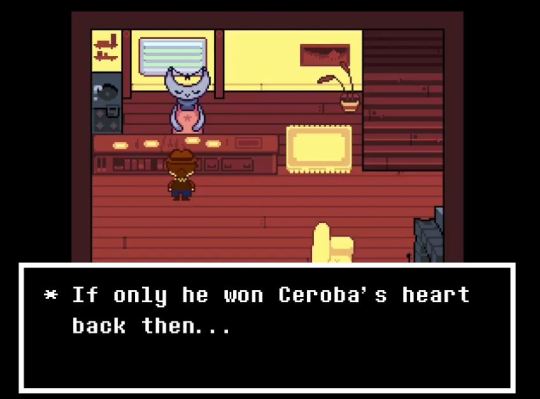
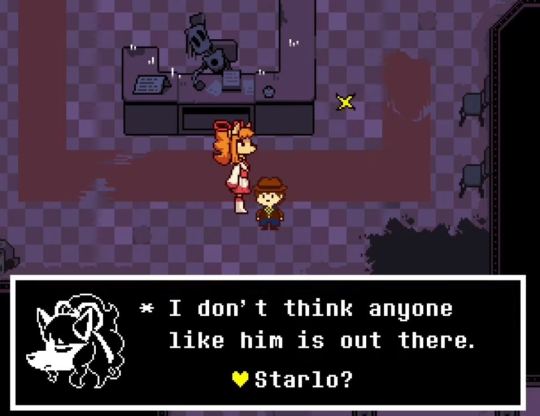
"Si users have a strong memory for past experiences and details" Yep, explained above. Also, dunno if this counts as noticing details, but we can make them beat the Shufflers’ game with ease.
"Si users are typically practical and realistic in their approach to solving problems" The Snowdin mini-quests come to mind (although they use past information here too to figure out what each character needs to be helped). Also, how they fixed the elevator by using a pickaxe (most practical & realistic choice). They’re also pretty rational while dealing with Guardener, and in general, while dealing with enemies.
Te (inferior) – I guess this is why I suspected they could be an ESTJ.
"seen as leaders" By everyone.
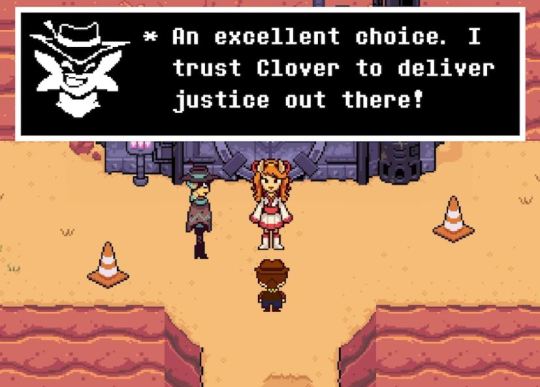
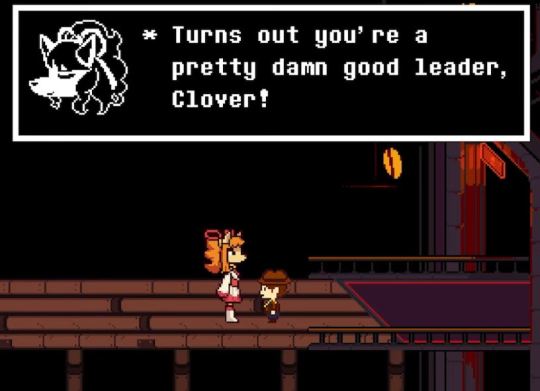
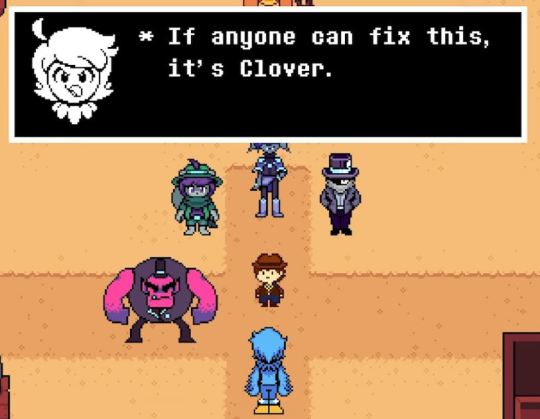
"Come up with ideas quickly" Pretty much throughout the game. They’re more low-key about this than ESTJs though.
"Ruthlss and domineering" This is them in vengeance route
"Extraverted Thinkers recognize the emotional content, but then they set it aside to focus on the facts" I feel like this inferior function of theirs is mostly seen in flawed pacifist. They recognized Ceroba’s emotional situation, but chose to be fair and just instead.
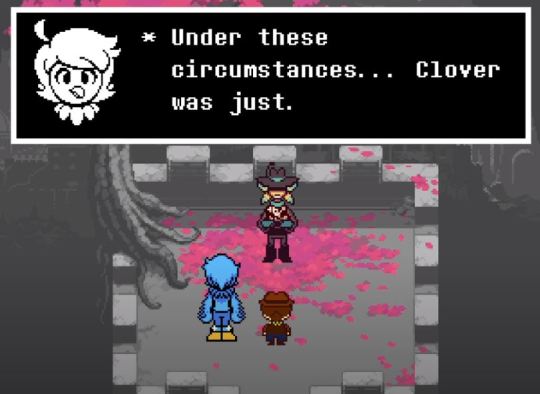
"Te users are logical" Recognizing the dangers of the Underground and deciding to stay with Toriel. We can also say it makes sense that Clover attacked those who attacked them first, and finished Ceroba off (Te is what is objective, but from the external world)
"Though they are generally free spirits, they like to have a certain order in their lives. They do enjoy structure, just as long as it does not intrude with their feelings/morals/ethics/etc. They like to be the ones to create the structure, not to have the structure to be created for them." Vengeance route and Clover’s "mission" come to mind. Basically, the structure is that, whoever Clover sees as morally flawed, gets to die. And they stick to it
tl;dr this picture pretty much explains the way I see Clover's functions in a nutshell ↓
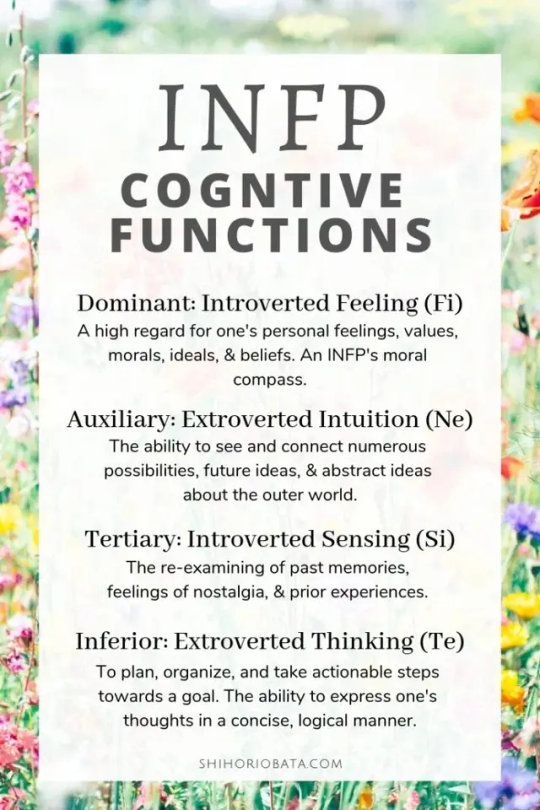
#another reason i think this type fits clover is bc it is my type too#and i relate to the kid sm#uty#undertale yellow#clover uty#uty clover#clover undertale yellow#undertale yellow clover#clover#character analysis#some part of me still finds it tough to differentiate ti and fi#but that future oriented personality was what steered me towards fi more#clover deff has a certain set of values and that was why they were kind to absolutely everyone in their way#in pacifist#they are such a moral kid#they value truth too but to a lesser extent than morals imo#uty spoilers#ceroba also called them naive#which makes me think Clover didn't have a logical plan#just wanted to right this wrong#and in geno martlet says smth like “you wanted to see the best in those kids”#again Clover doesn't know what they were like but chooses to believe they were good#innately kind that's who Clover is#but in geno they didn't broaden their horizons#long post
42 notes
·
View notes
Text
Marble Hornet headcanons everyone come gobble em up before they get cold!!! @forgottenporkbun @monszsterz
So my headcanons for MH are a lot less conceret than those for the creepypastas cause ngl, I'm still trying to figure out wtf happened in MH. I haven't read the comics yet so I'm going off the main videos only. I've rewatched them a few times and read the theories but I'm still left with a few questions, and some theories I have fall apart when paired against certain videos SO take everything with a grain of salt. Even WORSE is I'm still playing around with how I want to write these scenarios and dynamics because they change drastically based on what theory I'm going with at the time.
Starting off, I think The Operator (TO) is doing a lot of experimentation. Each person in MH is affected differently cause no two people have the exact same type of TO disease. The closest are probably Jay and Brian, funny enough, because both were infected by Tim. Tim is patient zero for the disease in the sense that he doesn't just have it, he IS IT. Each cell in Tim's body contains a little speck of TO that, when transferred to others, can multiply and spread into a spiritual parasite. It reacts differently to Alex because he's also hand picked by TO. We know Alex had been stalked by him from an early age, maybe his whole life. When he got infected it triggered a sleeper agent type parasite in him. He's a lot more aggressive, violent, and bold. I think the difference stems from where the seed of The Operator has been planted. For Tim its the body, and Alex I honestly think its the soul. I could say mind but I actually think that applies better to Seth (and Ticci Toby but I'm trying not to include creepypastas in this rn). If the disease works through the bodies of Tim, Brian, and Jay it makes sense why normal prescription medication works to stop it. If that's the case why isn't everyone infected and wipes out the world? We were nearly at the end of MH by the time Jay started REALLY showing signs of no return. At almost any point he could have left got some medication, and probably get over it! I mean its like, entry 80 before we see him wandering around in a daze and hallucinating, right? His symptoms always get worse when he's in an infected area or around Tim for a prolonged amount of time. Jessica on the other hand seems to catch it really fast. Like REALLY fast. A single interaction in Rosswood has her just as bad as Jay, who had been on the run for almost two years surrounding himself with this shit. She has also been stalked by TO since a young age. I won't be able to get into her more until I read the comics tho.
I see a lot of people confused as to what Brian's status ends up being with both The Operator and his friends cause me too tbh. His motives are constantly bouncing around. One thing I know is he is still buddy buddy with TO. Some people say he's fighting against him but I don't get that at all from the videos. He's either using special powers he was given or TO is monitoring him and stepping in when possible to teleport him to safety. If TO is wanting followers then it makes sense he'd encourage Brian to lure Tim back into it with him. The issue is Alex is ALSO a follower. The Operator finds himself in a pickle when his girls are fighting one another. This is where I really get thrown off. An easy answer would be The Operator is an inhumane, eldrich, perhaps fae monster with no understanding of how humans really work. This, paired with the fact his followers have NO idea what he really wants them to do, means miscommunication and chaos ensue. When Tim is killing Alex in the final entries TO bounces around BOTH of them to get in their way. We know he's fully capable of tossing Tim off to the other side of the woods, or snatching Alex out of danger, but he doesn't. He's watching....I think he wants to see which style of infection is better. Tim's disease, or Alex's corruption. Which makes a better follower. This falls apart when you remember how close Brian came to killing Alex and he got saved by TO. Again you can sweep this under the rug by saying either A: He wans't done having fun yet or B: It had to be Tim. The OP doesn't give a FUCK about Jay dying, he lets him get shot and then scoops him up for devouring. Same about Brian, he lets him *fall*. They're supplemental to the game. Its all about Tim and Alex.
Now my FAVORITE headcanon of all time I use everywhere no matter WHAT...Tim is The Operator's favorite. If we wanna include pre-MH lore about Slenderman, aka his origins in the photoshop contest, then we learn he's been trying to do something like this for a very long time. Tim may be the first person ever directly infected by The Operator to live to adulthood. He may also be the first one to consistently fall back into a state of obedience, aka, a masked state where he's being crazy in Rosswood in the middle of the night. That makes him the favorite child. He is disobedient to The Operator, curses him, openly hates him, and physically fights against him throughout ALL of Marble Hornets and yet Tim never gets killed or devoured. He definitely comes close to both. I think him being teleported around is The Operator's most merciful form of punishment to shake some sense into his first follower. Its basically evil time out lmao. He just ALMOST snags two more followers in Brian and Jay but alas we know how that ends. In most people's "fix it" au, or "no one dies" au, that isn't an issue. My "no one dies" au transfers into creepypastas and the mansion and there is a direct tie in there with Ticci Toby, his similarities to Tim, their relationship, and how The Operator acts. The best way I explain it (and the way that makes me laugh the most) is saying TO is like parents who were cruel af to their eldest child, but by their youngest, they're completely different people and wonderful parents. I wouldn't call Slenderman a wonderful parent even in a very wholesome creepypasta mansion Au but he's definitely BETTER THAN WHATEVER THE FUCK WAS HAPPENING IN MH!!! This results in the younger children (pastas) having no idea why the eldest children (Tim and Brian) fucking hate their parents. Its a very good silly dynamic to wrap up the most gut wrenching, tragic yaoi I have ever watched.
#marble hornets#masky marble hornets#tim wright#mh hoody#jay merrick#brian marble hornets#alex kraile#slenderverse#slenderman#creepypasta#ticci toby
24 notes
·
View notes
Note
do koltin and kilton fit in your extended demonology lorebuilding? interested what youd classify em as
THEY SURE DO, ANON, THANKS FOR ASKING!
Right so like, BotW/TotK is so incredibly far from the events of my AU, but I have definitely overthought about how the Demon Tribe stuff would fit Kilton and Koltin in.
Firstly though, some Boko Tribe stuff reminders
1) Their advantage is having very plastic physical adaptability <- to account for their wide variety of body types in the different games, encompass all the various subtypes (Moblin, Bokoblin, Miniblin, etc), and explain why they're the only demon tribe that has persisted in any noticeable numbers through the ages. They're just really pro at adapting to new things.
2) They're easily affected/warped by Magicka <- to account for the game's evil Bokos. In this way, they're a result of Malice being overused to control and resurrect them, rather than evil behavior being their norm. Basically they are on the same level of sentience as humans, but exposure to uncontrolled Malice degrades their minds much faster than it would others. It's essentially the flipside to the above plasticity advantage. They're malleable in ways that are both good and bad.
Man, what does this have to do with Kilton and Koltin, Shea?
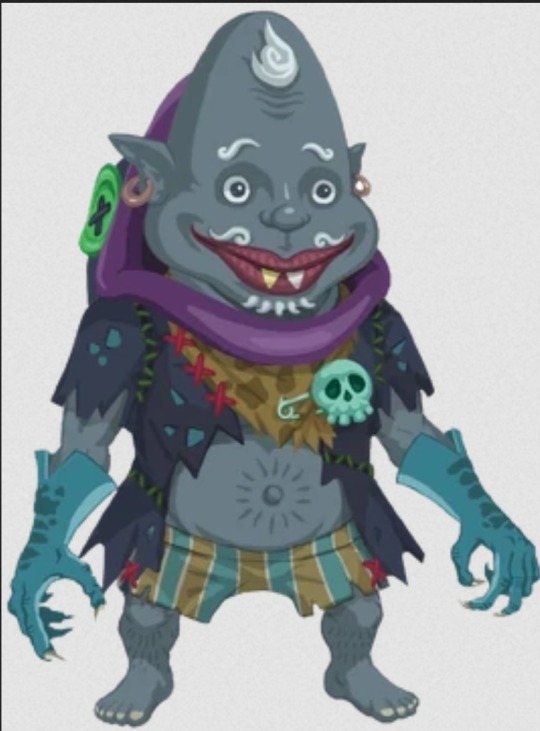
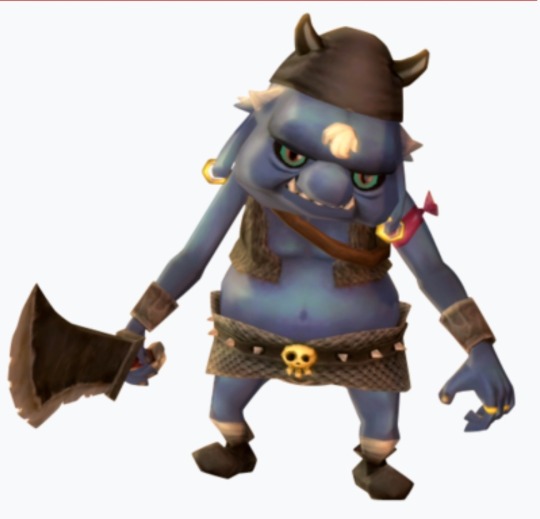
✨They have mixed Hylian/Boko heritage ✨
(I always thought the silhouettes here were really similar and wondered if it was intentional, but anyways)
So the headcanon here is that Kilton and Koltin's parents are a non-corrupted blue Boko and a particularly adventurous Hylian. I imagine they're a very sweet couple!!!! Here they are when they were younger.

I never thought of names for them, they just exist somewhere and probably don't hang out much in towns. (We love a power couple, but this sort of thing is likely to freak out the Hylian locals.)
I like to draw the two brothers with tiny little horn nubs as a nod to this. They don't have full horns and never will, but they probably were very excited for their lil skull bumps to grow like 0.05mm over the years.
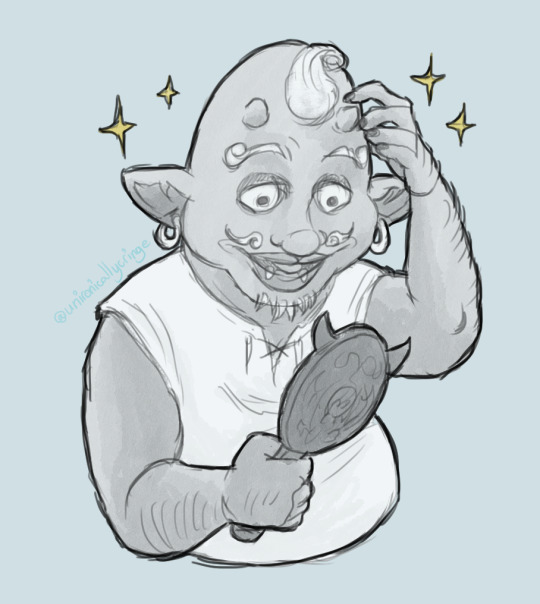
The family would very much be aware of the whole Malice corruption thing. That's why Kilton is so passionate about "monster education" - he knows the corrupt Bokos were once normal people and often just mind their own business in the wilderness, but also knows that it's dangerous for humans to try and approach. So his ventures with his traveling stall and presentations in Tarrey Town are his way of trying to bridge that gap safely.
Additionally, I imagine Kilton and Koltin can travel pretty easily amongst corrupted Bokos, but not bands of Lizal or Lynel. Kilton would have attempted creating masks because of this issue, then afterwards added the various Boko masks for humans to use. (The Magicka is extremely rudimentary, like, barely a Glamour if you're familiar with my magic systems, which is why they fail frequently). And sidenote for monster extract, I think it would be funny if it's just like, a normal ingredient his mom uses and he just puts purple food coloring in it for the Exotic Flair. Like it's just vanilla extract or something lmao.
That was the rambliest possible answer, but tldr they're half-Bokoblin teehee
#thank you for the ask i couldnt sleep so i decided i should doodle things#answered ask#demon tribes au#zelda headcanons#botw#totk#bokoblin#boko kana#my art#im back at it again with giving backstories to silly side characters#koltin is just reverse batreaux send tweet#kilton#koltin
160 notes
·
View notes
Text
A quick analysis of AFO's origin, the world frame of bnha and the core themes of the story :
From reading other people's metas and reading the leaks when they came out, my only solid take about it is that you cannot talk about bnha and the core theme of the perpetuation of violence without understanding how the Hero Society and the hero vs villain culture came to be.
That's what AFO origin is for.
Let's see if I can explain it:
In stories where a group of people suddenly gains powers, you'll always see that authors worry to portray how a change like that would affect the world at the moment. What does it mean that part of the global population now has access to something that others don't? Does that make them "better humans"? Are they superior to the rest and therefore should control them? Are they a danger to society? Should they be repressed or eliminated?
The thing is that powers can be viewed as a metaphor to real life situations we face. People with disabilities deal with the whole stupid idea that they are less than the rest of humanity all the time. You have sexism and racism and a bunch of other problems that at heart are about how to deal with different existences. Should people with certain privileges rule the world? Etc etc etc.
For a second, think of having superpowers as having a ton of money. Those with more money can help others or totally ruin their lives, right? In our world, people with money are directly involved in how justice works. They can corrupt the system or make it work, you know how it is. Yet, people with money are only people. We are all just that. Humans. No matter the amount of privileges, you can't escape your own humanity.
The way a person looks, the amount of money they own, where they are from, how they identify as, none of that makes a person more or less human. Similarly, having powers or the nature of said powers... It doesn't make a person less of a person, you know?
When you apply that logic to superpowers, you get what MHA is trying to say.
AFO lived in these specific conditions that were a result of the violence of his time. He would have ended up bitter anyway, because since he was born he was marked as a threat. When you reject someone like that, when you reject their humanity and you make an enemy out of there, you're not asking for a nice ending. If you teach them that they have to fight for the right to exist, you are asking for a war. It's like that in our world, it's like that in bnha.
What I'm trying to say is that superpowers are just an added variable in the complex equation of human coexistence.
The moment superpowers start to appear, society has to adapt fast. People that are also weapons don't mix well with the world's problems, after all. If you want to prevent mass killings, you need to set a system that rules the allowed behaviors and balances out the board. It's a relief that humanity is both capable of great horrors and wonders, so to every criminal that's set to use their powers for evil, you'll get an individual that wants to use their powers to stop them.
That's how vigilantes were born.
Then comes the legalization of powers and the individuals who use it to protect the system. That is how you get villains (people outside the law) and heroes (people following the law).
Violà. You have the same set of problems with a new feature: quirks.
How does this connect to AFO, you ask?
AFO's origin explains the complexity of the bnha universe, comparing it to our own. It also shows that there is always a context, as in situational factors that contribute to a person being the way that person is.
That doesn't excuse who AFO became, tho. The general rule dictates that we are responsible for our choices and actions in the face of the reality we were presented with. Maybe not while we are kids, because we don't have the maturity to make those choices. However, the moment we become adults, we cannot blame our choices anymore in the world around us. If you have the frame of mind to stop hurting people and you don't, that is on you. You chose to perpetuate the violence.
Of course, simplifications don't do any good and bnha makes that clear too.
A tale of heroes that are always good and villains that are always bad is just that, fiction. When the bnha society started believing that said fiction was their reality, that's when the real struggle of bnha started. Villains and heroes stopped being perceived as such. The dehumanization went both ways. The heroes became untouchable gods and the villains unforgivable demons. The civilians all excused their apathy and lack of action by saying they couldn't do anything in such a world.
People ran away from their responsibility by putting all the weight on the heroes shoulders and ignoring whatever felt uncomfortable or mildly disturbing.
See how quickly we were able to analyze bnha?
That's what I meant when I said at the start that AFO's backstory is crucial to the story frame of the manga. If AFO had been a villain just because, then you'd have a story of evil without reason that would validate the idea of extreme moralities of black and white. Since that's not the case, we got more depth in general.
It all connects to the message Horikoshi is trying to communicate. If you compare bnha to other shonens, you'll get the feeling that they all have something to say about that violence, about the way the world is structured and how people move around it.
It's a basic of storytelling, sure. It's just that now you have the knowledge to properly study bnha, or something like that.
At some point I'll have to reread the manga and pay attention to AFO's origin... That's everything for now, tho. Hope you enjoyed it whdhjsbdjd
#bnha#mha#my hero academia#boku no hero academia#shan's bnha opinions#shan's mha opinions#bnha spoilers#mha spoilers#afo#all for one
40 notes
·
View notes
Text
Paralleled Monstrosity - Dio and Diego
brief analysis below:
Dio specifically rejects his humanity. Humanity is something he sees little value in, and vampirism functions as a metaphor to demonstrate his inner cruelty on the outside. Yet it’s the immortal life of a monster that gives him time to contemplate the his human obsessions - the Joestar family, the Heaven Plan and even greater ascension. An obsession with the past. His obsession with finding peace of mind and understanding fate are very human goals. Ironically, over time Dio in some ways ended up finding his humanity through his monstrosity.
Diego could have been different. Diego lost his humanity. Not of his own choice, but because of a stand that spreads like a disease. Were this a different story and a different character, we might have seen him struggle to come to terms with having a thing like Scary Monsters become a part of him. Instead, Scary Monsters becomes just another tool to achieve his ambition. Scary Monsters quite literally turns Diego into a monster - a thing with claws and teeth, there’s a reason the arc is written like a horror - but it does very little to change who he is. If anything, it enables Diego to go more directly and dangerously towards his goals. SM gives him the power he lacked and in a sense enables his human ambition - to rise to the top. Diego controls the monster by holding onto his humanity, i.e. his ambition and pride.
Both vampirism and SM are supernatural afflictions the affected can, for the most part, hide well. The difference is that Dio doesn’t want to hide what he’s become. Vampirism became Dio’s identity - he chose himself to become the monster, and over time mellowed and recognized the value of what he had given up. Diego’s outward monstrosity only sharpened his human cruelty, enabling him to cut down whoever stood in his way, be that fellow racers or the President. His half-transformed state may be the most honest representation of his monstrosity: he’s ready to become the monster he looks, yet never forgets where he came from or what he’s fighting for. A monstrous human. A human-like monster.
Ambition is the shared, very human, trait between them. Dio and Diego’s monstrosity is the mechanism through which the corruption of their humanity is conveyed. Yet even as they became less than human, at their core they retained their humanity. Both social outcasts willing to break convention for the sake of rising above the humanity they hated. Becoming the monster because remaining human hurt too much.
#dio brando#Diego Brando#blud is onto nothing…#sbr analysis#pb analysis#??#jjba#my posts#I could probably write this better but it’s just something I wanted to poke at rather than examine fully#please feel free to add on!#steel ball run#phantom blood
33 notes
·
View notes
Text
[Before AU created]
Before everything turned into an AU, I only had some kind of distant idea.. probably just my vision of how they both continued to exist in the depths of BF's mind, forced to tolerate each other.
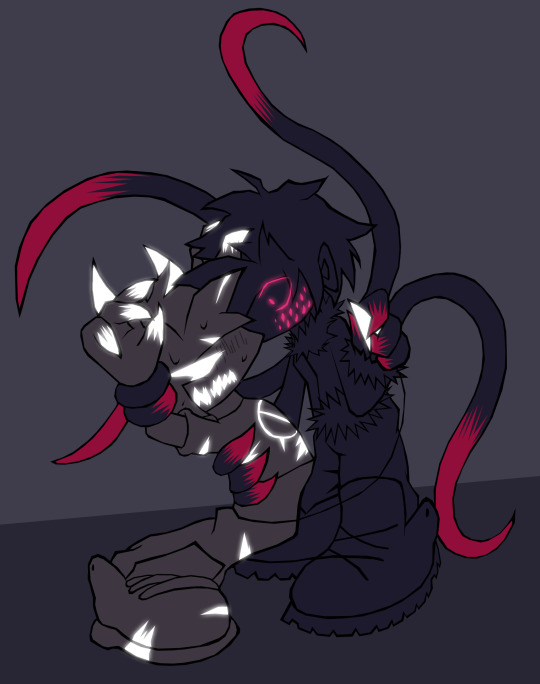
So initially, they hardly got along. Soul felt an open dislike for Corrupt, Corrupt responded in kind, although he himself felt sympathy for Soul, without realizing it. Over time, Soul got used to Corrupt's presence. In fact, Corrupt almost never harmed Soul without real reason, mostly when Soul himself provoked him into aggressive behavior. Corrupt simply responded with negativity to negativity. By himself, he was completely neutral to anyone expect BF maybe. As Soul got used to Corrupt and stopped provoking him, Corrupt began to show some positive emotions more often. In fact, he himself did not understand what these emotions were, and why he felt them, but at the same time he simply followed his heart.



One of my current friends gave me the idea that Corrupt, due to the fact that he has a connection with the BF, has a bit of humanity in himself that he doesn't understand at all. This all also created his strange attachment to Soul, most often expressed in a somewhat aggressive manner, because he simply didn't knew any other approach. As Soul got used to Corrupt and showed less negativity towards him, Corrupt increasingly succumbed to more positive feelings and showed a different side of himself. Although he still tried to hide it behind his usual demeanor, not completely trusting his surroundings, expecting a catch if he opened up. But over time, he was able to open up quite quickly and trust Soul..
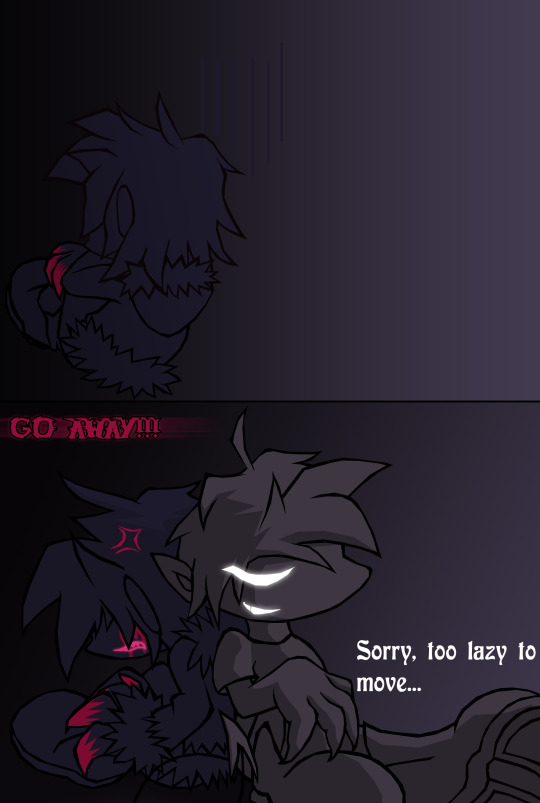
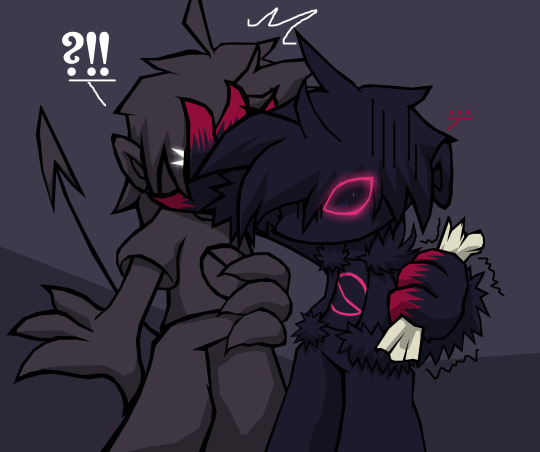
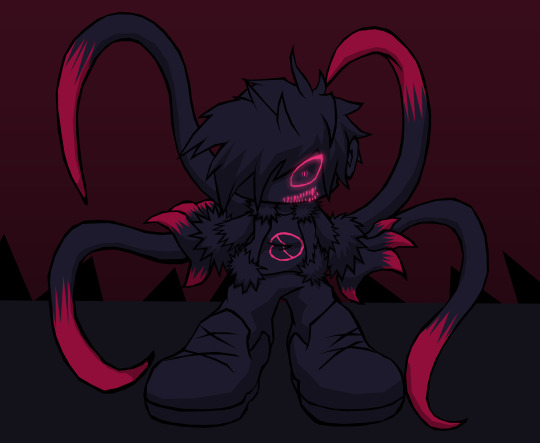
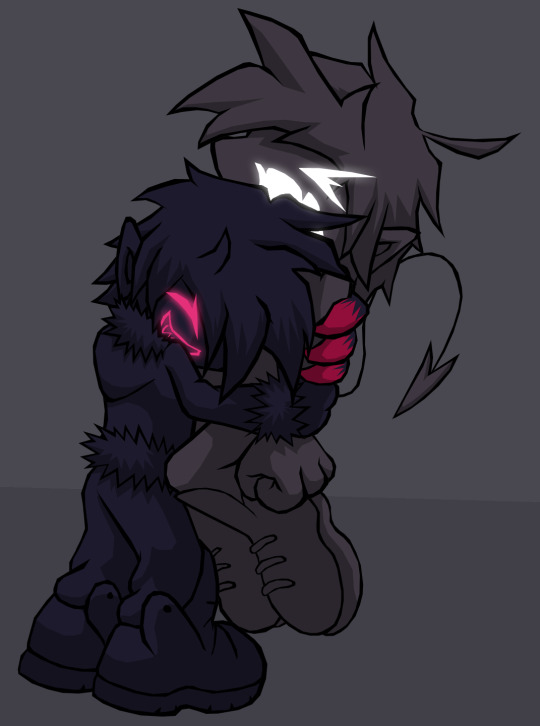
Soul was probably surprised by how Corrupt's behavior around him changed. He didn’t have time to really get used to his company and didn’t trust him completely, while Corrupt took it all much more simply. Maybe his connection with BF made him trust Soul quite quickly, while he did not show negativity and aggression towards Corrupt anymore. But all this could have quite a noticeable effect on Corrupt’s mood. If don’t think about surviving the apocalypse and the danger that Corrupt posed in the past, then to some extent he really was a dark version of BF, especially when control of the virus was destroyed. However, this behavior only occurred in private with Soul. Corrupt has never shown such behavior in the presence of anyone else, remaining extremely aggressive towards others. And to a greater extent, this was the reason why he tried to avoid others altogether. However, the virus hasn't disappeared completely. It remained, but only as an echo in the mind of Corrupt himself, and now became the voice of his own doubts. It never, even to this day, misses an opportunity to weaken Corrupt's spirit at any moment that would cause him to weaken. For what? Because it enjoys his pain first, as if it makes it stronger. Corrupt can become a greater danger to others if his spirit is broken enough that he loses control of himself, allowing the virus to take over him again. No, this does not affect Soul or BF in any way, unless Corrupt directly affect them in their own mind. And since things happened mainly in the mind, all these doubts and pain took the form of chains that kept Corrupt in a separate dark and lonely place, often until someone from the outside it interfered with it.
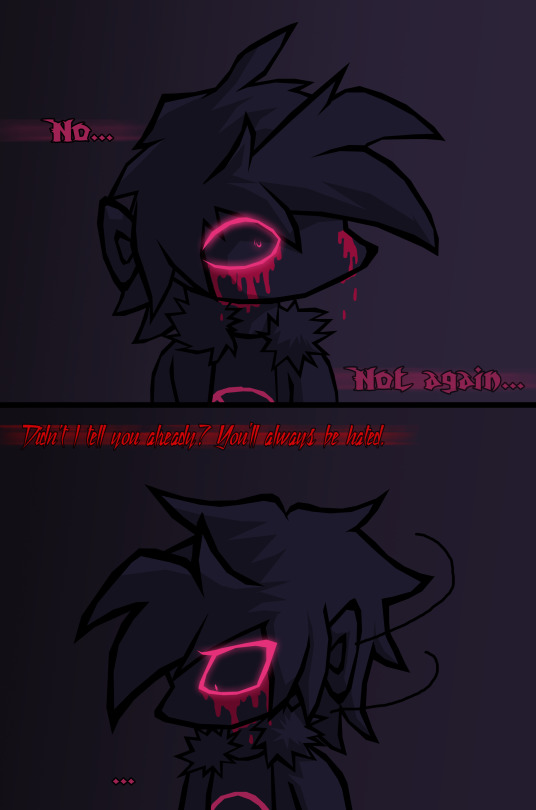
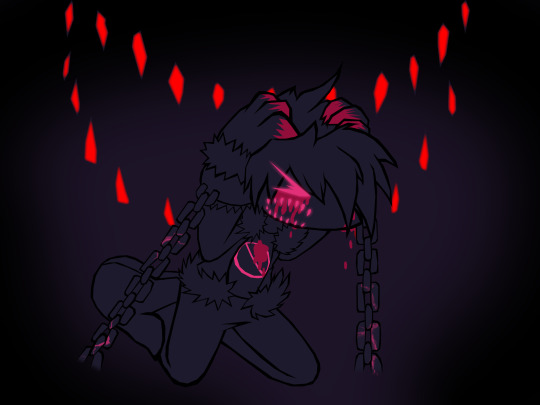

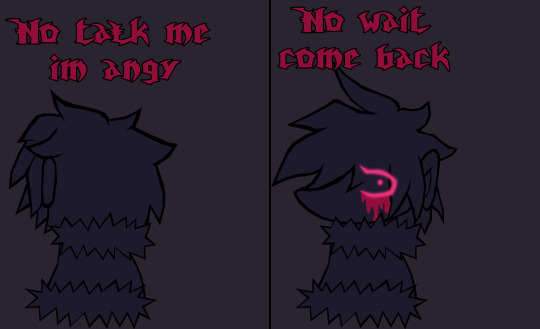
This, isn't all of coursr, but somewhere after that it began to turn into an AU, which I created under the encouragement of my former friend. I have collected here the very first pics that about these two, but have not yet begun to turn into Soulmate Demons AU. And I think this post is already getting too long.. To be continued, I think.
#FNF Corruption mod#FNF Corruption AU#FNF mod#Friday Night Funkin#FNF#Soulmate Demons AU#SmD AU#Corrupt BF#Soul BF#damn I'm nervous#I usually don’t have to think much about others will see it#but this is a different site and it’s unusual for me#god give me courage..
28 notes
·
View notes
Text
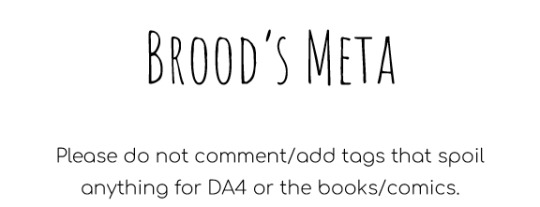
okay. aforementioned meta time.
aka: solas drew the veil and plunged the world into chaos... but my best guess is, he had to.
ft.: if he was wrong to do so (which i don't think he was), then the inquisitor is just as wrong during in hushed whispers
solas' goals were pretty straightforward: he wanted to liberate the enslaved elvhen. to do that, he had to stop the evanuris, who were, without a doubt, the world's most powerful mages.
and others have posited theories about more going on, theories i tend to agree with, at least in terms of broad strokes. specifically i believe there's a connection btwn the evanuris and the blight and that, unchecked, they truly would have destroyed the world.
in which case, he gets an additional goal: save the literal world.
i also tend to agree with the idea that red lyrium has something to do with the blight. so moving forward with these two theories...
things blight/red lyrium can affect (in game canon):
stone
animals (including moles and worms via ambient dialogue in suledin keep)
humans
elves
dwarves
qunari
dragons
so it's reasonably safe to say that not only does the blight impact people, but it impacts the planet/nature as well. so if he took action to stop the blight, then by doing so he sacrificed arlathan to save the entire rest of the world. and the extreme measure he took here was likely necessary because of the strength of the evanuris - one man, one mage, however skilled, could not effectively fight them all. as a direct confrontation he would have lost. but there's still a heavy implication that he warred with them (or perhaps for them - either way, he was a soldier) for some time, that he "spent lives," which to me implies that he was something of a general waging a war against the evanuris, at least at one point. so it's safe to say that he actually tried to go head to head with them - and he couldn't. not even with an army.
i have seen his actions within the timeline of dai contrasted with the inquisitor's actions during the in hushed whispers timeline, and i think that's a very valid comparison to make: he woke to a world that was unrecognizable to him, corrupted by his actions, but also saved by his actions! but he wants to bring what was good about the world back. as inky in that timeline, we are willing to destroy everyone in order to "reset" the world and have another chance to take down corypheus.
in game, the world doesn't seem too bad to us. sure, it has its issues, but it's still a functional world, right? the people inhabiting it, most of them want to continue to live the rest of their lives, right? i don't think we can say the same isn't true of the future timeline we saw. there was absolutely deep corruption and danger, and the inquisitor's companions seek a reset, but what of those outside southern thedas? we never know, we never see their lives. what if others were gearing up to attack - what if they'd been able to succeed? instead we determine that this future is so awful, so intolerable, through our limited, narrow point of view of it, that it should be erased, should be completely unmade.
and in-game, this reads as ethical! but it's also analogous to what solas is doing and to what he did in arlathan. i don't think that paralleling is unintentional, either: what we see in that future is very much what he sees in the present, and we're both right, these times are "corrupted," are "broken," are "different" and are "wrong." but as inky it's presented as an inevitability - of course we would seek to restore, to reset, and nevermind all that we'd be destroying in the doing. leliana says this explicitly to dorian, that for him this is a nightmare he hopes will never come to pass, but the rest of them lived it, it was real.
to solas, the world is half of what it should be. everyone is walking around not knowing how much they are missing, unable to recognize the deep loss of magic for what it is. it's a gutted world, and that it's all these people have ever known... well, does that make it right to keep it as-is? because if so, how did the inquisitor have the right to reset the world in that timeline?
(little note: i have not engaged with any media outside of the main game canon and certain dlcs. however, i also do not personally hold that canon outside the games/major dlcs is absolute canon and should be 100% trusted. this is just how i engage with this franchise. so if smth i said here is disproved by non-game canon, personally that doesn't rly matter to me uwu;; to each their own tho!)
#solas#dai solas#broodmeta#rolls around#these are not all unique takes! not at all!#but i just wanted to compile my full pov on this matter somewhere
24 notes
·
View notes
Text
People love to talk about Darkness as a corrupting force, but I love the idea of Light that corrupts more for these specific reasons.
1. Corrupting Light is often mistaken as religious zeal or a Higher Calling, and thus disregarded as unimportant by those who only see the Dark as a corrupting force.
2. When you disregard all other things for your Higher Calling, you can become very cold and callous, but these are seen as “necessary sacrifices for the greater good” because the action is never done out of personal gain or greed.
3. A person’s personal image when they devote themselves to the Light is untainted, spotless. Seen as a pedestal of Purity and a benchmark to achieve on the path to purity. It makes it easier to manipulate people this way, and people are more likely to be swayed to your cause because they see your cause as Just and not self-serving.
4. The Mortis Arc in the Clone Wars does an insanely good job of explaining the dangers of being just as devoted to the Light and someone being just as devoted to the Dark. There is a *reason* the Father exists in the Grey between and does not let either his Daughter or his Son have complete control. The easiest solution would be to simply kill the Son and leave the Daughter, but the Father *does not do that.* He is adamant there must be Balance.
5. The concept of Ashla (Light), Bogan (Dark), and Bendu (Balance) is further explained as an underlying theme for the entire third season of Rebels, wherein Kanan (Ashla) is attempting to save his Padawan Ezra (Bogan) from the Dark Path. They find the answer lies in the Bendu, in the push and pull and the Balance, because one cannot exist without the other. And ultimately this understanding will sway the final story arc, it sways Sabine’s training with the Darksaber, it gives new understanding to flawed ideals upheld by both Jedi and Sith.
6. I love the idea that an Order of 10,000 Jedi versus 2 Sith is seen as Balanced, because at the core of it they *are.* Because Sith are not the only evil in the Galaxy; the Hutts have a massive slave empire, as do the Zygerrians. Evil is rotting the Republic from the inside out, and there are only so many Jedi to combat it. So when the Sith start to *also* gain control, the delicate Balance is tipped unequally.
7. Corrupting Light is the act of being callous and manipulative in the cost of a self-sacrificing act for the greater good, and as such can be excused by the general populace because “the ends justify the means.” I think a *major* point of Palpatine’s manipulation of the Jedi was *not,* in fact, seeing if he could turn them Dark, but rather seeing how far they would go in the *Light* to protect the Republic, thus having to discard their morals about what lines need to be drawn because the Greater Good is receiving more and more threats that need more aggressive responses.
8. Corrupting Dark is ultimately selfish, self-serving. It is easy to condemn it because it benefits only a few rather than benefiting the most. It is blatant and ugly and out in the open.
9. So, when Palpatine did what he did, he took the piety and devotion and made them become *Brighter,* not Darker, but having the same result of corruption in the opposite angle. You see Obi-Wan rationalizing harming Anakin during the Rako Hardeen Arc. You see the High Council trying to gaslight Ahsoka into being grateful for her trials in the Sabotage Arc, and being genuinely confused when she doesn’t see it that way. You see Obi-Wan’s desire to help the Zygerrian Slaves turned against him, and he no longer tries to help One because it will affect the Many, and his ideals prevent him from giving the Warden the killing blow - it has to come from Rex.
10. Dark and Light need the Balance or they can both Corrupt Absolutely, just in different ways, and the Force was Unbalanced in *both directions* during the Clone Wars.
7 notes
·
View notes
Note
Seeing your ask on Plural and I’m wondering if you would like a plural character in League maybe with a shapeshifter gimmick to represent the two personalities/spirits.
Either a case of D.I.D or of spirit possession or symbiosis with another sapient creature.
Because it is a very Christian/Western concept to think all spirits possession as a negative one takes all fight between two entire with many cultures having shamans who let spirits use their body for healing rituals. I think that blends into D.I.D too. Despite them being really different.
This even goes into Scrizophrina which is a totally different condition. With people from more rural areas reporting more positive hallucinations then from the industrialized developed world.
It’s worth noting that in Japanese a animist based culture there are much more positive portrayals of spirt possession and split personalities like in Yugioh.
Hrm, I can't really speak to your latter comments there, I don't know enough about either animism or schizophrenia (which is not the same thing as DID) to comment. Nor on the thing about shamanic cultures, although it feels a bit like you're generalizing there.
But as for League, depending on how you want to read them, there already are plural characters in League of Legends - Varus is three distinct personalities in one body, and Kalista is... somewhat inconsistently written, but in concept she is a system of all the spirits and consciousnesses of everyone who has invoked her to seek revenge.
If you want to stretch it, you might even argue that the Kindred are a plural character. They have separate bodies, but they are one person expressed in two personalities, and their origin story specifically relates them as one entity who split into two personalities because they were quite simply happier and more complete that way.
Of course, in the case of both Varus and Kalista, those characters are written from the perspective that their plurality is some kind of distorting affliction. Varus is a corrupted monster trying to possess the body of Kai, while the consciousnesses of Kai and his lover Valmar try to resist. It sorta shakes out to a shoulder angel/shoulder devil scenario where Varus pulls on Kai's anger and thirst for revenge, while Valmar tries to remind him of his humanity.
Legends of Runeterra tried to move the character in a different direction, conceptualizing them much more like a harmonious plural system that is in agreement with themselves, rather than a "tormented struggle over the true nature of the soul" sort of thing, but it's still kinda in the concept of the character that Varus' plurality is a corruptive body horror.
With Kalista, the storm of consciousnesses inhabiting the shared body has been shown to be a sort of chaotic, destructive thing that is eating away at her "original" personality and replacing it with a single-minded revenge spirit, and that's basically written as a tragic, bad thing that represents the loss of her true soul to the corruption of vengeance, anger and hatred.
The Kindred, if you want to interpret them as plural, are much more balanced and harmonious, two expressions of the same being, bonded by deep mutual love and affection.
None of them, of course, are intended to be plural representation - at least not as far as I know. And honestly, yeah, I think it would be extremely cool to have a character that is intentionally and conceptually designed to express something real about the plural experience.
I'm... not a hundred percent sure if I'd trust Riot to be able to do a good job of that, though. There's a lot of Too Many Cooks bullshit that happens at Riot, which undermines most good-faith efforts from its creatives to do interesting things. Some higher up business-suited jackass might just be like "other stakeholders think it's cooler if they're a gross evil monster who is evil because they're plural because being plural is bad and weird and makes you dangerous to people around you" and then whoops here comes a James McAvoy in Split ripoff champion :/
#tb answers#plurality#league of legends#league of legends varus#league of legends kindred#kalista#league of legends kalista#varus
102 notes
·
View notes
Text
video



In the ending where Sean dies and Daniel makes it to Mexico, Daniel definitely loses a part of himself without Sean. He remembers him, sure, but he still gets corrupted by all the crime. It looks like a local gang takes him in because of his power, but he looks SO different. At least I'm glad he doesn't kill those people, only threatens them.
I'm glad he picks up drawing, too, and gets good at it.
This ending still feels wrong, though. Not only he has to pickpocket and survive on his own, and grown up in all that violence, he has to do it without a parent figure or his brother. I mean, with Sam and Nathan, at least Nathan had his brother, they were inseparable, and Nathan lost Sam when he was already 18-20. So no longer a kid.










This ending absolutely destroyed me, even thinking about it makes me cry now. I'm curious if my playthrough was enough to go with this ending. I mean, my Daniel already refused to hurt more people, so I think it might've been my ending if I went with "Surrender".
Funny thing: my first thought at the border was: "Do I surrender?" I googled and saw a happy Mexico outcome and went, "Screw it. Go to Mexico."
Maybe I should have went with this one. It's not as bad as I expected it to be, honestly, Sean even seems to release a comic book with/for Daniel from prison. And the way both Lyla and Daniel waited for his release all that time, and no doubt visited him. Reminds me of Sam and Nate sooo much.
However, the way the go hiking in the same forest they had to spend the night in as kids, and Sean breaks down by the fire, and how Daniel holds him. The way they hug before going for their own, separate cars, and Daniel sits there for a while, trying not to cry.
The way prison seemed to be break Sean. A fifteen year long sentence for crimes he didn't even commit. I mean, what did he do? Protected Daniel from a racist bully and killed him by mistake? Stole some gear from a racist owner to survive with Daniel out in the woods? In my playthrough, killed some manipulative religious fanatic that wanted them to burn alive in that church? Sean never hurt that cop, it was Daniel. Plus, it wouldn't have happened if the racist cop didn't shoot the boys' dad for no reason.
Like, come on. Sean deserved better. This ending is heartbreaking and I need a fix it now.

The evil happy ending where, I assume, Daniel is taught to be put himself and his brother first, no matter the cost. Couldn't be my ending, for sure, I taught Daniel better than that.
But hey, when brothers hold hands. <3

Man, they're so evil. That Mexican couple in jail was right. Gangs, violence. I think Daniel is overall better with Sean with him, but it's still somewhat of an immoral outcome, I guess.

I mean, in the both surrender ending, Sean ends up with a white eye after prison and is overall more timid? In this ending, Sean has a black eye and he seems to be enjoying this kind of power and violence? Just look at that smirk. What is he going to do when his brother is not around to protect him?



Though they seem smarter than that. Maybe the meetings always happen at their shop? The way Sean knew how to act to show Daniel he's in danger. How truly worried and genuinely angry Daniel is over the thought of those people hurting his brother, how fast he comes to his aid. He literally breaks a dude's wrist for pointing a gun at Sean.
Plus, in this ending, Sean doesn't have the trauma of spending 15 years in prison for the crimes he didn't commit... Also, in this ending, you can just see how much Daniel loves his brother (just the example above proves it) and would do absolutely anything for him, no matter the cost. He still doesn't kill those people that threaten them, which I think is good, but he is heavily affected by this life.



But hey. Having a repair shop together, watching sunsets while sipping bear, holding hands, be together for life? If they have to be evil, at least they get to do it together, so not the worst outcome, either.
I think, judging by every outcome I've seen, including mine where Daniel surrender but makes a path for Sean, I'd say the ending where Daniel refuses to surrender while Daniel wants to do so, so Daniel gets Sean killed and has to survive on his own, might be the worst one. Yeah, he's free, but he's so, so alone. Most importantly, it seems that he's lonely, too, and can't trust anyone. Better the evil together ending than growing up alone in Mexico ending, while he's 10 years old and has to fetch for himself.
I also find it a bit weird that we don't get to see any meeting with the kids from chapter 3? In my ending, as I romanced Cassidy, Sean sends a pic of himself and her on the beach. You're telling me that if both brothers make it to Mexico, they don't find their way back to those people? That makes no sense. Plus, considering how evil they now are, they might just get along with Finn and his shitty ideas? If he doesn't get greedy again and want to steal from the brothers. 🙄
I didn't think I would, but I have so many thoughts on this game. I dislike a lot in it, the LIS series is still not for me due to the stories about kids and somewhat weird writing, but I'm not immune to brotherly love. After all, if Sean and Daniel didn't remind me of Sam and Nathan, I wouldn't play this game at all. So, I'm glad I did. Lots of potential in the endings.
I hope AO3 isn't empty. Having finished the game tonight, I'm very emotional about it.
#life is strange 2#natisplaying#long post#shipcest#I'm kind of normal about this relationship#but kinda not#proship#I totally see them as platonic#but I can see how this can be turned into romance too#don't come for me#my eyes are still full of tears for that surrender ending#it's brutal#diazcest
2 notes
·
View notes
Text
Spooky Season 2024: 39-45
1408 (dir. Mikael Hafstrom, 2007)

A paranormal skeptic visits an alleged haunted hotel room. It turns out to be haunted. Moral of the story: when Samuel L. Jackson tells you a hotel room is evil, BELIEVE HIM.
1408 is emblematic of how I feel about most Stephen King anything: it's a mix of really potent, effective horror with the goofiest things I have ever seen (there's literally a scene that plays like Groucho's bit with the mirror in Duck Soup and I could not tell if it was supposed to be funny or not). It comes off like a Nicholas Cage movie without Nicholas Cage, though that's not to say John Cusack does a bad job in the lead. Despite Samuel L. Jackson being prominently placed on the posters, this is essentially a one-man show, with Cusack acting his heart out amidst silly CG ghosts in the hotel room from hell. I didn't think it was amazing, but it is fun at least.
The Innocents (dir. Jack Clayton, 1961)

A governess fears her charges are possessed by ghosts, but her fervor to save them might be the greatest danger of all.
The Innocents is a dynamic chiller, one of the most atmospheric gothic thrillers I have ever seen. My perspective on the characters and story evolves every time I see it. The viewer is never told the "truth" of the situation. Are there actually ghosts possessing the children or are they merely traumatized? Is the governess a savior or an agent of destruction, unwitting though she may be?
If you haven't seen it, do not read the rest of what I have to say, because you'd be robbing yourself of a wonderful experience with one of the best horror films of all time. But I do want to talk about my current reaction to the central character, Miss Gibbens the governess.
SPOILERS

This time around, I found myself actually frightened of Miss Gibbens.
In the past, I found her sad and disturbed, but this time around, the danger she poses to those kids stood out more than usual. When she says she isn't a "cruel" person, I certainly believe her, but good intentions do not absolve her actions of psychological harm. If anything, the woman has a savior complex, likely augmented by her being a clergyman's daughter. At one point, she says her father taught her to "help people even if they refuse my help"-- basically to shove her brand of salvation on people no matter the harm it does because the ends justify the means.
And then there is the weird sexual undercurrent of her relationship with Miles. It's clear Miss Gibbens is enamored with her employer, the aloof bachelor who supports the children but otherwise wants nothing to do with them. She cannot be with the object of her desire for a variety of reasons (class difference, his disinterest, her own moral scruples, etc.), but her infatuation does not dissipate. Instead, she seems to transfer these affections onto Miles. Miles puts on a bit of an act, assuming he's quite grown-up compared to his sister Flora and flirting with Miss Gibbens (almost as though he were imitating Quint?), and maybe this act also influences Miss Gibbens to an extent. The dynamic between them gets really damn creepy and gross, with Miss Gibbens cloaking everything in her more amiable desire to help others and be needed. That final kiss she plants on his mouth after he dies never fails to make me shudder-- it's incredibly disturbing.
Miss Gibbens' lack of awareness-- of her own desires and of the real world-- is largely her fatal flaw. She is herself an innocent in many ways, thinking the uncle will care about her ghost theories, assuming her good intentions mean the children will not be harmed by her forcing them to confront their trauma head-on, seeing Miles as both child in need of help and corrupted, sexualized adult in a child's body. And yet, her innocence does not make her heroic or even good. It simply leads to more tragedy.
Deborah Kerr is amazing at channeling all of these contradictory elements of the character. Really, hers should be considered one of the great performances of all time, it's so good.
Candyman (dir. Bernard Rose, 1992)

Graduate student Helen is studying the urban legend of the Candyman. In life he was a Black artist named Daniel Robitaille, a son of former slaves who was brutally lynched after his affair with a white woman was discovered. A skeptic, she inadvertently summons him from beyond the grave. She is subsequently hurtled headlong into a nightmare scenario in which she is accused of several murders and her only salvation is offering her life to the Candyman as a sacrifice.
I knew about Candyman for years and it was sold to me as a slasher. It really isn't when you watch it-- with its mystery and crime thriller elements, it resembles a giallo, only far less goofy. While there are a handful of cheesy slasher moments, this is more of a gothic thriller with a dark romantic edge (romantic in the Mary Shelley sense, I mean).
But yeah, this was great. I really never knew where the film was going, and much of the imagery genuinely creeped me out. However, I also found the lore of the titular character fascinating. He essentially remains "alive" through the urban legends spread about him and resents the protagonist's efforts to make people disbelieve. The juxtaposition of the grounded, real world setting and the eerie, otherworldly images associated with the Candyman gave the film a rich sense of the uncanny. I can definitely see myself revisiting this one again and want to get a physical copy ASAP.
Also, Tony Todd's voice is just--- YES.
Bride of Frankenstein (dir. James Whale, 1935)

Following the events of the first movie, the Monster survives the burning windmill and seeks out companionship in the countryside. Meeting mostly fear and violence, he is driven to Dr. Pretorious, his creator's former mentor and an avid devotee to the idea of creating a new race of beings. Pretorious and the Monster join forces to coerce Henry Frankenstein into making a mate for the Monster, but their efforts do not end how they desired.
What can I say about this movie? It's absolutely brilliant. It takes all the strengths of the first film-- the pathos, the campy humor, the gothic production design-- and cranks it all up to eleven. Literally, my only beef is I WANT MORE OF THE BRIDE. She is so iconic and Lanchester gives her such an unsettling, alien presence. I wish she had been given more opportunities to play the character.
The Mad Doctor (dir. David Hand, 1933)

Pluto gets kidnapped by an insane scientist who loves cutting every living thing in sight into pieces. It's Mickey Mouse meets Saw, more or less.
One of the classic Mickey Mouse cartoons, the macabre humor is off the charts here, paying homage to the aesthetics of the gothic horror films of the period. It's a really good homage too-- the backgrounds and effects are astonishing. There's a sequence where the "camera" is following Mickey through a tunnel and the evocation of three-dimensional space is so cool. Part of what I love about Disney in the 1930s is how ambitious their work could be, even in short films like this.
Peeping Tom (dir. Michael Powell, 1960)

A shy photographer kills women while filming their deaths for a "documentary," but a burgeoning romance with a young woman threatens to both upend his mission and reveal his crimes to the authorities.
Disturbing and tragic, Peeping Tom remains a unique horror experience. It gets compared to Hitchcock's Psycho often-- both of them were controversial proto-slashers about disturbed, sexually repressed young men whose childhood abuse turns them into killers. Both films came out in 1960 and pushed at any notion of "good taste" with their sexuality and violence. However, Psycho became its director's biggest hit, while Peeping Tom permanently damaged Michael Powell's successful directorial career. While Psycho also provoked disgust, it was also more "fun" and humorous, while Peeping Tom has a sadder core. The ending haunts me in a way few other horror movies do.
Sisters (dir. Brian De Palma, 1972)

Ambitious young reporter Grace Collier witnesses a murder in the apartment across from hers, but when she cannot get the police to believe her story (mainly due to their prejudice against her, as she's written articles critical of police brutality and racism in the past), she investigates the crime on her own. Her inquiries uncover a disturbing conspiracy involving a pair of previously conjoined twins and the emotional rift caused by their separation.
Sisters has become a staple of my Halloween viewing since I first saw it years ago. It's weird because I initially didn't like it very much, but now I count it among my absolute favorites. It's certainly a riff on Hitchcockian themes of voyeurism and violence-- movie geeks will easily spot references to Psycho and Rear Window-- but it has a very countercultural edge. Having seen De Palma's earlier, politically charged comedies like Hi Mom! really illuminates that element of the film, particularly its feminist themes and commentary on police corruption.
But that all sounds very academic, and this film is anything but a dry pamphlet on sociopolitics via 1972. This is a darkly funny and stylistically playful thriller with some visceral shocks, and the performances from Margot Kidder and Jennifer Salt are absolutely amazing. Actually, I love Salt's character Grace the most. She's abrasive but ultimately sympathetic and admirable, her aggressive personality hiding a great many vulnerabilities, namely her anxiety about going nowhere in a writing career her mother seems to view as a distraction from "proper" womanly goals like getting married before age 30. I find Grace a funny yet poignant character, her fate disturbing.
#spooky season 2024#thoughts#1408#the innocents#candyman#bride of frankenstein#the mad doctor#sisters 1972#peeping tom
6 notes
·
View notes